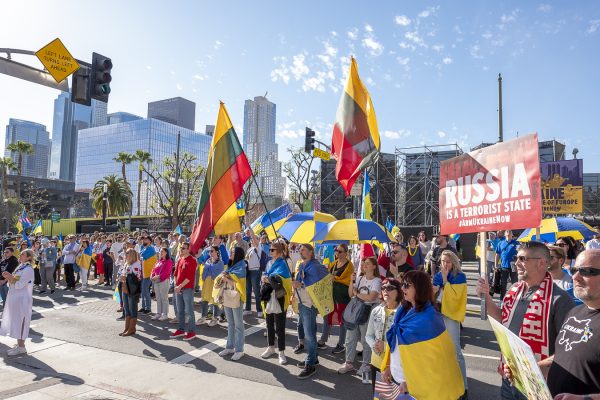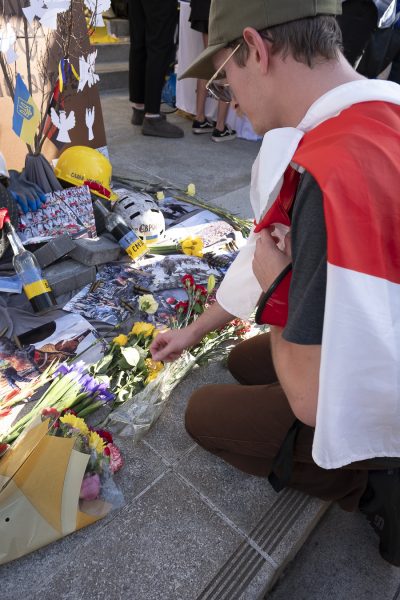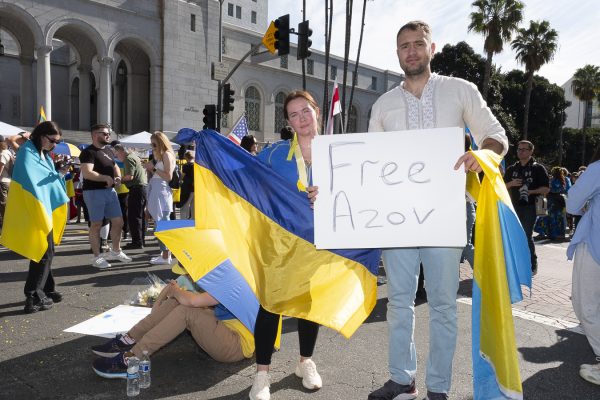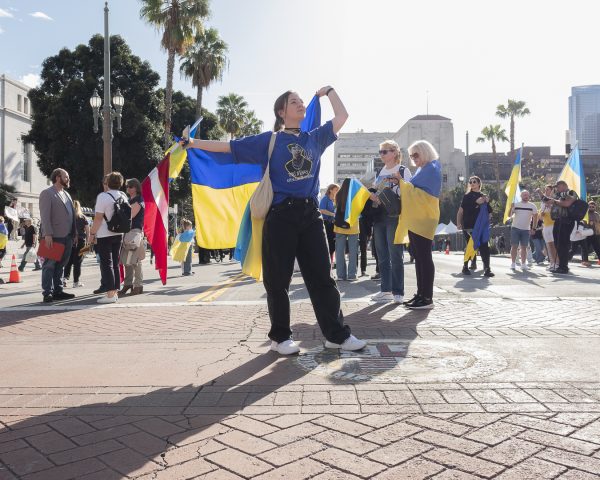
CITY HALL – Demonstrators marked two full years of Russia’s revanchist invasion on Feb. 24, with hundreds gathered at the LA City Hall steps in support of Ukraine. Organized by the Stand with Ukraine Foundation (SWUF), dozens of motorists rallied at UCLA at 11 a.m. They then drove within a police motorcade across the city, sporting their automobiles’ now well-branded blue and yellow Ukrainian flags and sunflowers.
At 1 p.m., a procession of automobiles arrived at City Hall, where they met hundreds more attendees, many dressed in traditional Ukrainian folk garb, wearing flowers in their hair, everyone holding hand-painted signs of protest condemning Russia.
The event was MC’d by SWUF President Mykhailo “Myshko” Lavrys, who arranged for Ukrainian cultural and community leaders to speak alongside government officials and foreign diplomats.
Rep. Brad Sherman, a U.S representative and Ukraine Caucus member, delivered a message read by 32nd District staffer Taleen Keuroghlian. Sherman has long stood for Ukraine, being one of the first to advocate for lethal aid during the 2014 invasion of Crimea. He acknowledged that Ukraine has been fighting for its independence for hundreds of years, first from the Russian Empire, the Soviet Union and, “a brutal attack on civilians ten years ago to punish Ukrainians for choosing a Western future during the Maidan protests.” U.S. Rep Sherman confirmed to applause that “he will continue to stand with Ukraine … for as long as it takes to bring peace to Ukraine.”
“This is a war we can not afford to lose,” proclaimed Laima Jurevičienė, Consul General of Lithuania.

A message reiterated by two EU diplomats who shared the stage, Philippe de Mûelenaere, Deputy Consul General of Belgium and Chair, Council of the EU Members in Los Angeles and Hanna Kumpusalo-Tyukalov, Deputy Consul General of Finland, all of whom explicitly stated a credible fear of Russian aggression towards the Baltics if Ukraine were to fall.
Jurevičienėre concluded her speech saying, “Ukrainian people are fighting not only for the freedom of their country.. they defend us, all the democratic world, our values and rules-based international order.”
Paul Krekorian, LA City Council president and first Los Angeles Armenian-American elected official, took the stage expressing Los Angeles’ solidarity with its Ukrainian population. He condemned “Putin’s illegal, immoral, unprovoked aggression against the people of Ukraine,” drawing parallels to those that the people of Armenia now face from the dictatorship of Azerbaijan, warning that if “the world fails to stop aggression anywhere it is going to experience aggression everywhere.” Krekorian’s speech drew applause as he closed by saying City Hall would be yellow and blue that evening.
Erin Bromaghim, LA Deputy Mayor for International Affairs, gave a particularly empathetic and well-received speech. Bromaghim recalled where she was on Feb. 24, 2022. “Two years ago, I know you remember where you were. I remember where I was, being on Signal chats from around the world, watching on television… seeing this devastation, with my small children, watching the world, trying to make sense.”
Bromaghim’s speech gave insight beyond the broad strokes of geopolitics; she paused to avow the human toll but also revered the Ukrainian spirit. “The devastating impact on the lives of women and children, men throughout Ukraine,” she said. “But we’ve also seen extraordinary resilience.”
Many of those in attendance have suffered significant personal loss, and at least for now, there is simply no going home.
Dmytro Doroschuk, a professional basketball player from Zaporizhia, the city where Russians attacked a nuclear plant that has endured perpetual shelling since the war started, was on tour in Europe for the start of the invasion. He said one “could not go to Zaporizhia because there is no Zaporizhia.” He and his wife now live in Burbank, Calif.

He went on to explain that “we need the support,” but the demonstration provides more than just a platform to announce a message; it gives refugees like him and his wife a place to unite with a community, “we come here to be some part of a family.”
Viktoriia, a 23-year-old native of Kharkiv, had been “living a normal care-free life,” working at a pharmacy, doing everything a person in their 20s does until the morning of Feb. 24 when she was awoken to a phone call from her father warning that the invasion had started.
“I couldn’t believe it,” Viktoriia said, “I was looking out of the window, witnessing people running and abandoning their houses.” She “left her flat with the thought I might never return.”
That morning, Viktoriia hastily packed a bag and drove 87 miles to her parent’s house with her boyfriend, picking up a few family members.
When they arrived, they were “unsure what to expect,” so they slept fully clothed in the basement. The next day, they received news that Russians were advancing to their town. “As the Russians approached, the first thing on my mind was our family pictures — I didn’t want to lose our memories to the Russians.“ She described tearing the photos out of their frames.

Viktoriia has been in Los Angeles for six months. She describes the rally as providing her with “a sense of belonging” and that it intrinsically fulfills “what it means to be Ukrainian.” She explained that “standing up and speaking loudly, freedom is ingrained in our DNA.”
Lesya, 16, from Berdians – a Mariupol suburb, and Maria,19, from Kherson, suffered the worst of the fighting in the early days of the war and drone footage shows nothing left but rubble. They met at the protest. In the limited English Lesya knows, she expressed that their newfound friendship “feels like a home.”
The demonstration concluded with a ceremony of laying flowers on the City Hall steps, where photographs of victims and their personal belongings had been placed.
Nik Venet can be reached at [email protected].
